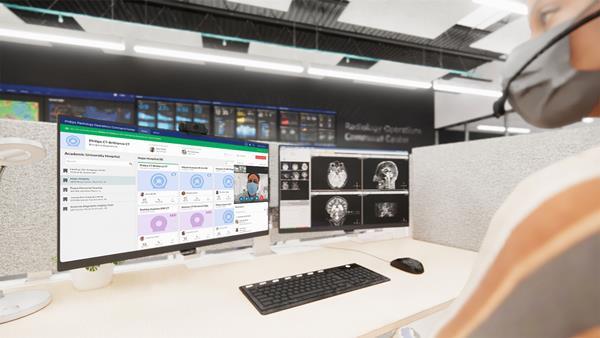As a multimodality (MR and CT), vendor-neutral digital hub, the Radiology Operations Command Center connects imaging experts at a central command center with technologists and onsite staff in locations across an entire enterprise for real-time, over-the-shoulder collaboration and support.
Philips Introduces Radiology Operations Command Center at RSNA 2020: Enables Real-time, Remote Collaboration to Broaden Expertise Between Technologists, radiologists and Imaging Operations Teams Across Multiple Sites via Private, Secure Telepresence Capabilities

Linkedin
Twitter
WhatsApp
Facebook
Copy Link
November 24, 2020
Philips notes in addition, they note, proprietary digital technology developed by Philips helps maintain business continuity, increase enterprise-wide radiology productivity, minimize issues with image quality, and expand access to advanced MR- and CT-based diagnosis.
Philips Radiology Operations Command Center enables virtualized imaging operations via a private, secure, and auditable telepresence platform. Philips is the first company to market a radiology command center that can integrate with existing technologies and systems outside Philips.
As a multimodality (MR and CT), vendor-neutral digital hub, the Radiology Operations Command Center connects imaging experts at a central command center with technologists and onsite staff in locations across an entire enterprise for real-time, over-the-shoulder collaboration and support. Powered by Philips’ proprietary, patented operational performance management technology, Radiology Operations Command Center enables remote access to scanners across an imaging network.
Its remote scanner connections are compatible with older imaging platforms, allowing customers to operationalize a ‘Hub and Spoke’ model for imaging within their current install base. Radiology Operations Command Center enables multiple use cases such as virtual imaging assistance, virtual on-demand cross-training, and remote adjustment of imaging protocols for greater standardization.
Addressing imaging technologist shortages, inconsistent workflows, and quality issues
As radiology networks expand their services, they continue to experience technologist shortages, skill limitations, image quality issues, and scheduling challenges, all of which impact patient care. Variability in imaging technologist expertise and procedure quality can lead to the need for repeat scans and recalls, resulting in additional procedure and training costs. Imaging procedure training, which traditionally requires in-person onsite training, is often difficult during the current COVID-19 pandemic. Combined with challenges in maintaining business continuity resulting from staff turnover and recruitment difficulties, both of which have been further complicated by the pandemic, today’s imaging environment requires a totally new approach.
Philips’ Radiology Operations Command Center addresses these challenges by providing virtual remote access and workflow capabilities in a secure environment. Integrated solutions linking MR and CT to the command center will help increase the value and productivity of lead technologists, minimize image quality issues, accelerate training, and reduce travel time between sites for updating protocols. Radiology Operations Command Center helps expand access to imaging across an enterprise to help improve patient outcomes, improve patient and staff satisfaction and lower the cost of care.
Expanding access to imaging services to enable expert care
With Philips Radiology Operations Command Center, radiology departments can expand access to imaging across more locations and during more convenient hours to help meet patient demand, while increasing capacity and throughput within existing labor resources limits. Radiology Operations Command Center’s telepresence capabilities give imaging centers access to imaging experts allowing them to expand their capabilities to provide complex procedures and specialty sub-services such as virtual colonoscopy, cardiac CT, Breast MRI, and prostate MRI.
This allows imaging providers to improve imaging exam quality to help reduce or eliminate negative patient experiences such as procedure recalls or repeats, while also helping to improve talent retention within their organization by reducing the burden on their staff.
“We understand the pain points our customers face in terms of staff variability, training levels, and the need to maintain standardization of both the imaging quality and the patient experience – pain points that have been further accentuated by the COVID-19 pandemic,” said Kees Wesdorp, Chief Business Leader, Precision Diagnosis at Philips.
“As an integral component of the Philips Radiology Workflow Suite being featured at RSNA this year, Philips Radiology Operations Command Center enables our customers to virtualize imaging by setting up a unique model of operations to seamlessly extend their expert talent across all sites. By working with advanced imaging partners like RadNet, we see the virtualization of imaging as a game-changer in radiology workflow.”